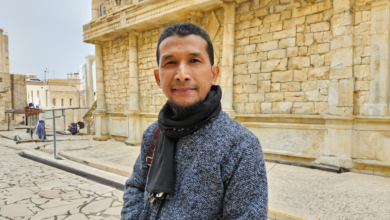
DDHK.ORG - (Adapted from the Chapter of Akidah and Muamalah Fiqh Book of Minorities)
Covering one's genitals is like wearing a hijab for women is fardhu 'ain that should not be abandoned. They are prohibited from removing it in front of other people and not the mahram except in an emergency.
The Imposing Proposition
Allah says;
وقل للمؤمنت يغضضن من أبصرهن ويحفظن فروجهن ولا يبدين زينتهن إلا ما ظهر منها وليضربن بخمرهن على جيوبهن ولا يبدين زينتهن إلا لبعولتهن أو ءابآئهن أو ءابآء بعولتهن أو أبنآئهن أو أبنآء بعولتهن أو إخونهن أو بنى إخونهن أو بنى أخوتهن أو نسآئهن أو ما ملكت أيمنهن أو ٱلتبعين غير أولى ٱلإربة من ٱلرجال أو ٱلطفل ٱلذين لم يظهروا على عورت ٱلنسآء ولا يضربن بأرجلهن ليعلم ما يخفين من زينتهن وتوبوا إلى ٱلله جميعا أيه ٱلمؤمنون لعلكم تفلحون
"Say to the women who believe: Let them hold their gaze, and their genitals, and they should not reveal their jewels, except for what is (usually) seen from them. And they shall put a veil over their breasts, and do not reveal their jewelery except to their husbands, or their fathers, or their husbands 'fathers, or their sons, or their husbands' sons, or their brothers, or the sons of their brothers, or the sons of their sisters, or Islamic women, or the slaves they had, or male servants who had no desire (for women) or children who had not understand about women's genitals. and do not strike their kakinyua so that the jewels they are hiding are known. and repent, all of you to Allah, O you who believe so that you may be lucky. [QS. An-Nur, verse 31]
Rasulullah said to Asma ';
يَا أَسْمَاءُ إِنَّ الْمَرْأَةَ إِذَا بَلَغَتِ الْمَحِيْضُ لَمْ تَصْلُحْ أَنْ يُرَى مِنْهَا إِلَّا هَذَا وَهَذَهَذََ َ
"O Asma ', a woman when she has grown up does not deserve to be seen from her except this and this (face and palms)". [Narrated by Abu Dawud, number 4106]
Based on this textual argument, a woman is not allowed to open her genitals in front of anyone other than her mahram except in an emergency.
Dar al-Ifta 'Egypt issues a fatwa;
أما بخصوص الحجاب فهو واجب في حق النساء, ولا يجوز للمرأة أن تخلع الحجاب إلا إذا خافت الضرر على نفسها أو عائلتها
"Regarding the hijab, women are obliged to wear it, and she must not take it off unless she is worried about the dangers to herself and her family." [Dar al-Ifta ', Su'âlât al-Aqalliyyât, (Cairo: Dar al-Ifta', 1434H), p. 718.]
Emergency Limits
The emergency in question is as explained by Prof. Dr. Wahbah al-Zuhaili;
الضرورة هي أن تطرأ على الإنسان حالة من الخطر أو المشقة الشديدة بحيث يخاف حدوث ضرر أو أذى بالنفس أو بالعضو أو بالعرض أو بالعقل أو بالمال وتوابعها, ويتعين أو يباح عندئذ ارتكاب الحرام أو ترك الواجب أو تأخيره عن وقته دفعا للضرر عنه في غالب ظنه ضمن قيود الشَّرْعِ
"Emergency condition is the arrival of a condition of danger or very serious hardship to a human being which makes him worry that there will be damage (dharar) or something that hurts his soul, limbs, honor, reason, property and everything related to it, so that at that time it cannot be avoided. must do what is forbidden, or leave what is required, or postpone the time of its implementation in order to avoid the fade which he thinks could befall him as long as he does not leave the conditions determined by sharak ". [Wahbah al-Zuhaili, Nazhariyyah al-Dahrûrah al-Syar'iyyah, (Beirut: Mu'assasah al-Risalah, cet.4, 1985), pp. 67-68.]
The Egyptian Fatwa Institute in Su'âlât al-Aqalliyyât explains if wearing the hijab in that condition gets a hostile response from other parties that are impossible to face, or results in job loss on the condition that there is no other source of income that can be sought for living expenses so that it can threaten his life, then specifically in that condition the minimum or the shortest possible time he can remove the hijab while still trying to cover it as much as possible while begging Allah for forgiveness, because carrying out a religious prohibition in an emergency is only a modest count. [Dâr al-Iftâ 'al-Mishriyyah, Su'alât al-Aqalliyyât, p.404.]
What is meant by "just" can be exemplified by a female patient who is injured who has to be sewn on the upper part of the wrist (aurat) while there is no female doctor at the time of urging, so the male doctor can take action with a note that the patient's sleeve. shall not be rolled over the injured part, that is, the emergency level is only on the part to be treated.
Even so, women who work in places where hijab is prohibited are obliged to get a new job as soon as possible that can guarantee that they are free to live their religious teachings, because after all this obligation to wear hijab is based on the argument that is qath'î dalalah, that is, it does not contain other interpretations such as the obligation to pray, fasting, zakat and haj for those who can afford it. However, if for example the work is based on a contract until the specified time, then if the woman resigns before the contract expires, she will be subject to a fine, while she is classified as incapacitated or solely relies on living expenses from the salary for work at that place, then she can complete the work contract. keep trying to wear her hijab as best she can at that time and then immediately move to another place.
Must Believe in Allah
However, as Muslims, we must believe in Allah, the Almighty Giver of Rezki, one of the following words of Allah;
وَمَن يَتَّقِ ٱللَّهَ يَجْعَل لَّهُۥ مَخْرَجًا
ويرزقه من حيث لا يحتسب ومن يتوكل على ٱلله فهو حسبه إن ٱلله بلغ أمره قد جعل ٱلله لكل شىء قدرا
"Whoever is fearful of Allah, surely he will make for him a way out. And give him sustenance from the direction he did not expect. And whoever puts his trust in Allah, Allah will provide (his) needs. Indeed, Allah carries out the affairs (wills) Him. Indeed, Allah has made provisions for everything ". [Surat al-Thalaq, verses 2-3.]
Allah knows best. [DDHK News]



